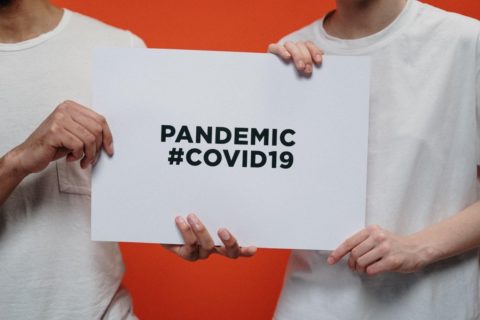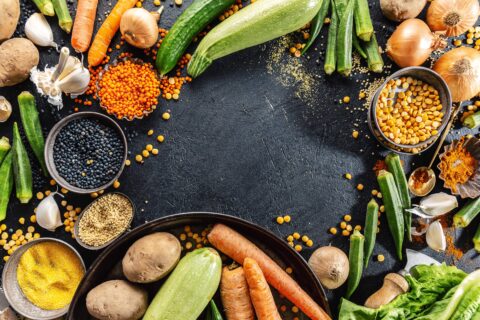The Vegan Plate: Tips for a Healthy Lifestyle and Diet
Increasingly more people are deciding to go vegan for ethical, environmental or health reasons. It can seem overwhelming to know what kind of foods to eat on a vegan diet with the myriad of information all around. But it really couldn’t be any simpler.
What does one eat on a vegan diet?
A vegan or plant-based diet is food comprising of vegetables, fruits, legumes, lentils, wholegrains, nuts and seeds. Vegans do not consume any animal derived foods or products like meat, fish, dairy, eggs and honey.
Typically, vegans eat more fruits and vegetables, foods that are higher in fibre and lower in saturated fat. A simple well-planned vegan diet contains all the nutrients we need to remain in optimal health.
According to the Becoming vegan food guide, divide your food plate into the four food groups -vegetables, fruits, grains and legumes. Then add a small portion of healthy fat like nuts, seeds.
Optimize your health with these tips for a healthy diet
- Vegetables and Fruits
Fruits and vegetables are an important source of vitamins, minerals, phytonutrients, antioxidants and fibre. Choose a rainbow of colors every day to ensure you are getting a full spectrum of health benefits. Vegetables don’t contain cholesterol and eating a diet rich in vegetables reduces the risk of many chronic diseases.
- Lentils and Legumes
Beans, peas, kidney beans, black beans, chickpeas, soy and lentils are excellent sources of plant protein. Consuming legumes is recommended because they are also a good source of fibre, folate, potassium, iron and zinc.
- Wholegrains
Wholegrains such as oats, wheat, barley, jowar, ragi, millet, rice along with pseudocereals such as quinoa, amaranth, and buckwheat, provide complex carbohydrates, fibre, and phytochemicals. They also contain important B vitamins and minerals like iron, zinc, magnesium. They are preferable to refined grains because the refining process removes the dietary fibre and nutrients eg. White flour and white rice. In addition, they increase blood sugar and insulin levels faster, which can increase the risk of obesity and diabetes.
- Nuts and Seeds
Nuts and seeds provide a balance of omega-3 and omega-6. Additional nutrients include magnesium, fibre, potassium and Vitamin B6. Magnesium and potassium help prevent osteoporosis. Sources of omega-3 are walnuts, canola oil, flaxseeds and omega-6 are sunflower oil, corn oil, soybean oil, sunflower seeds, walnuts, pumpkin seeds.
Protein on the mind-
Animal sources of protein, like meat and cheese, tend to be high in unhealthy saturated fat. Vegan sources of protein include tofu, tempeh, soy, lentils, chickpeas and beans, grains like amaranth, jowar, bajra, millets. Nuts like almonds and walnuts and seeds like sunflower and pumpkin seeds, hemp and chia seeds have high proportions of protein.
Many people think it’s difficult for vegans to get enough protein but it’s not an issue for someone eating a varied diet. Also, there are plenty of good environmental reasons to cut out animal sources of food.
Other important nutrients-
Optimal vegan nutrition is ensured by eating a balanced and varied diet taking care to have the critical nutrients.
Vitamin B12
B12 is necessary for proper red blood cell formation, neurological function, and DNA synthesis. Since B12 is made by bacteria in the soil, nowadays it’s difficult to obtain because of the sanitized methods of food production. Although many foods are coming fortified with B12, those eating a vegan diet can ensure a proper supply of vitamin B12 by taking dietary supplements.
Calcium
Calcium is important for the growth and maintenance of bone health. To meet one’s calcium needs, consume calcium-rich plants like dark green vegetables, oranges, figs, nuts, sesame seeds, raisins, tofu.
Vitamin D
It helps the body absorb calcium and is needed for health and maintaining strong bones. Expose your face and forearms to warm sunlight for fifteen minutes at least to avoid deficiency of this vitamin.
Iron
Since the body cannot produce iron, it must be ingested in sufficient quantities through food. Iron deficiencies can be avoided by maintaining a healthy and varied diet, and by regularly eating iron-rich foods such as red lentils, kidney beans, spinach or tofu.
Omega 3 Fatty Acids
Omega-3 fats are polyunsaturated fats, important for the long-term health of the heart and brain. Vegans should make sure they’re getting enough, the most common sources are walnuts, flaxseeds, chia seeds
Quick Tips for a healthy diet and lifestyle-
- Choose natural, unprocessed foods, and buy local and organic.
- Eat a variety of food from all food groups – eat a rainbow of color.
- Be moderate in your intake of fats, oils, sugar.
- Ensure that you exercise regularly and get plenty of sleep.
- Stay hydrated.

Photo by Nadine Primeau on Unsplash
A plant-based diet is your best defense against disease. Plant-based food contains more fibre and less saturated fat. Many lifestyle diseases can be avoided by shifting to a plant-based diet. Vegans on a healthy plant-based diet are also far less likely to suffer from obesity, cancer, heart disease, blood pressure, cholesterol, and other lifestyle diseases.
Whatever your reasons for choosing to go vegan, you are making a huge change to your health, animals and the planet.
*Please note this is only a general guide. For any special health issues please consult a vegan dietician or doctor.
References:
3.https://www.healthline.com/nutrition/vegan-diet-guide#section3
4.https://ods.od.nih.gov/factsheets/VitaminD-Consumer/
5.https://www.internationalvegan.org/nutrition/
6.https://www.hsph.harvard.edu/nutritionsource/what-should-you-eat/vegetables-and-fruits/
7.https://www.livestrong.com/article/190429-vegetarian-foods-list/




